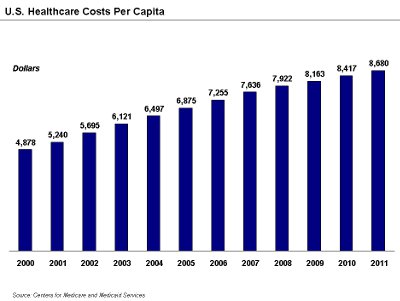 7th Nov 2013
7th Nov 2013
Why is Healthcare So Expensive In The United States?
The topic of healthcare has been on the minds of a lot of Americans recently with the discussion of the rollout of Obamacare. Healthcare costs, quality, and reform have been headlining economic, political, and social news with growing frequency. Casting aside the politics, smokescreens, and posturing related to the healthcare debate, it’s useful to take as objective a look at the facts and details of the healthcare system in the United States to understand the economics of the US healthcare system. Parsing through the details of what healthcare costs and comparing it to what Americans get in return provides a good baseline for figuring out solutions that will: 1) help us be healthier, and 2) reasonably fit within the typical American budget.

Healthcare costs in the United States have been rising so fast than many Americans are having trouble keeping up.
The factors that have been put forth and explored as reasons for the high cost of health care in the United States range from having an aging population (more need per capita for healthcare services) to advances in medical technology (better healthcare) to anything in between. Considering the healthcare industry as a business, or a group of large businesses, allows us to see what factors are leading to an entire industry being dysfunctional.
Inelastic Demand
The healthcare industry is very different from others that comprise any economy. Healthcare, which boils down to keeping oneself healthy, is much more personal than any other purchase. People often find substitutes for communication, transportations, beauty, living situations, and other needs. When it comes to healthcare, a person is typically willing to pay the cost to stay healthy, most of the time without paying so much attention to how much the service or procedure costs. Imagine taking your sick child or another loved one to a doctor, who makes a recommendation that you purchase a particular prescription or have a particular operation performed. Your decision to proceed with that recommendation is based much less on the cost than it is on the deeply personal need that you have to take care of your child’s health.
Complexities Associated With Health
Another complicating factor in the healthcare industry is the very nature of staying healthy. Genetics, environment, lifestyle, happenstance, and countless other factors affect the health of any particular person. The human body is so complicated that no doctor or group of doctors can come close to fully understanding how to address the overall health of any given patient.
Compare making a decision about your healthcare to a decision about buying your next smart phone and communication plan. You can go to one of many competing wireless providers and compare features and costs relatively simply. After shopping and gathering information about phones and associated plans, you decide which best suits your needs, and make an intelligent choice (including the possible decision not to get one at all) that you can be confident about.
Healthcare purchasing decisions don’t work this way. Because of the complexities involved in overcoming health issues and addressing symptoms, purchasers of healthcare products and services have no real alternative but to trust that the medical professionals responsible for their health understand at least somewhat conclusively that the diagnosis and treatment plan they prescribe are going to have good outcomes. Anyone who has had to go back several times to fill different prescriptions for the same problem knows that it’s a trial and error process. The lengthy list of warnings and side affects you see at the end of advertisements for the next great wonder drug is clear evidence that, in terms of mastering its subject matter, the entire healthcare industry has a long way to go.
Insurance
Since we’re considering healthcare costs, lets add to this mix of variables a middle man relationship that makes it so that healthcare costs are almost entirely abstracted from the end user. Instead, prices and treatment classifications are managed through a complicated system that involves insurance companies hoping to make a profit and medical providers. You can see that this quickly gets to be foggy for everyone.
The simplest way to characterize the puzzle that has led to such high healthcare costs in the United States is this: the healthcare business model in the United States is broken. Healthcare providers and their customers simply don’t understand the costs associated with healthcare.
Solution
Researchers Michael Porter and Robert Kaplan, professors from the Harvard Business School, recently suggested a solution to the expensive healthcare problem in the US. Their conclusion is that healthcare systems need to be able to accurately measure costs on a per patient basis. Healthcare providers can then begin to compare those costs to outcomes, and ask questions related to the value provided by the system with the intention of improving the costs and outcomes of the systems. The video embedded below explains their research and conclusions for improving healthcare.





